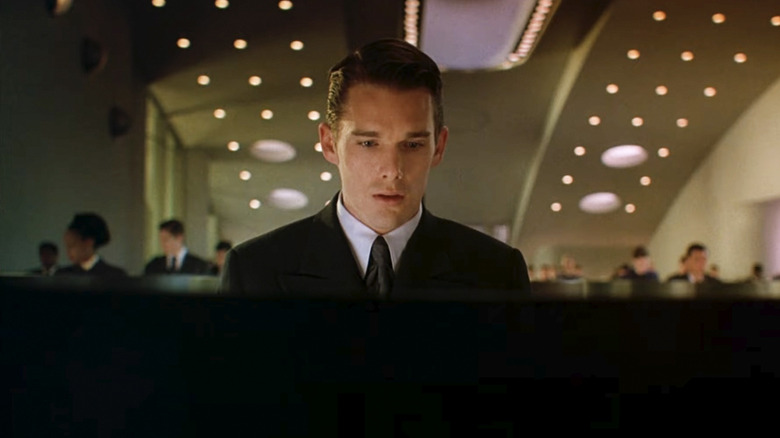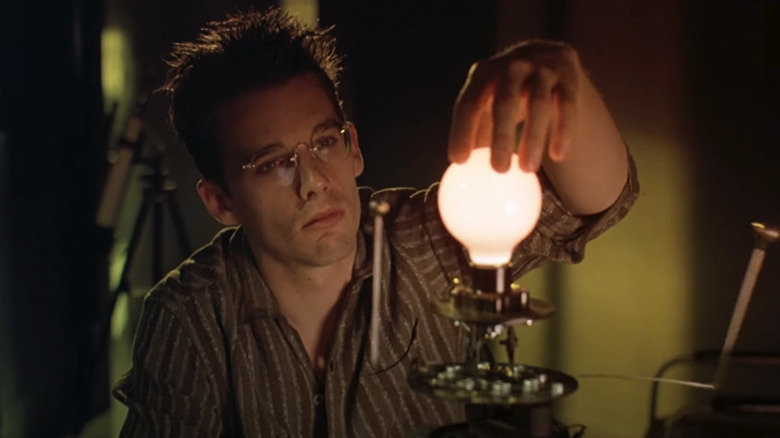This post contains spoilers for “Gattaca.”
Despite its tight budget, Andrew Niccol’s “Gattaca” has always felt prescient, with its near-future storyline about genetic determinism undertaking an exploration of root-level societal discrimination in a world devoid of meaningful privacy. Here, technological advancements in genetic studies have prompted a genetic registry database — a rule book that classifies humans into problematic categories, deciding who is more “valid” in terms of their value to societal development and scientific advancement. Naturally conceived individuals are prone to be termed as “in-valids,” as they are considered susceptible to genetic disorders or aberrations. Vincent Freeman (Ethan Hawke) is one such man, who can only dream of being an astronaut but never actualize such ambitions … unless he resorts to unconventional means, like identity theft.
While the society in “Gattaca” does not legally condone genetic discrimination, those branded as “in-valids” face discrimination at every turn, as their births are deemed as ones hinging on faith, as opposed to the clinical nature of genetic selection. Vincent is made to feel inferior by his own parents, as his brother, Anton — who is conceived via genetic selection — serves as a constant reminder of Vincent’s so-called genetic inferiority and the fact that he is susceptible to medical conditions and is unfit for certain professions. Even when looking for an entry-level job, genotype profiling is rampant, where qualifications, intelligence, or business acumen mean nothing compared to a “superior” genetic profile.
The crux of “Gattaca” is Vincent’s efforts to impersonate Jerome Eugene Marrow (Jude Law), an ex-swimmer with an off-the-charts genetic profile who is currently wheelchair-bound after a car accident. Jerome willingly offers Vincent the opportunity to embody him — become a “borrowed ladder” — in exchange for a sustained lavish lifestyle. But as the film’s very fabric delves into the intricacies of genetic makeup and DNA, what does the term “Gattaca” actually mean?
How the term Gattaca relates to the film’s themes
To keep things simple, the term “Gattaca” was created with the four letters used to identify the four nucleobases in DNA, namely GATC: guanine, adenine, thymine, and cytosine. Every personal motivation or instinct in the film is thoroughly defined by an individual’s desire to either reinforce or go against their determined genetic profile (and how it is perceived by society as a whole), with Vincent’s dreams taking center stage in a fight to prove himself worthy. Even after Vincent “becomes” Jerome, he has to be careful about never leaving any genetic imprints of his own and has to constantly borrow Jerome’s DNA to mask his own identity; it’s a literal charade that plays out until Vincent is approved for a mission at Gattaca Aerospace Corporation.
“Gattaca” constantly pits the expectations surrounding a so-called “valid” individual against how these expectations manifest in reality, challenging the notions of perfection and superiority in several ways. A recurring motif is the game of chicken that Vincent and his brother Anton used to play as children, which the former never won, except right before he left home as a teen. After reuniting with his brother as an adult, Vincent wins the game again while saving Anton from drowning a second time despite being socially deemed as the “weaker” one. Vincent reveals that he was able to win the game as a teen by not conserving his energy or pacing himself for the journey back: a sentiment that comes full circle when Vincent takes off for the mission in space, knowing he is leaving Earth behind with a sense of bittersweetness.
Gattaca explores identity and profiling through a sci-fi lens
The unfair and futile nature of the genetic determinism employed in “Gattaca” is also realized in Jerome’s arc. When a murder occurs at Gattaca Aerospace Corporation just before the space mission to Titan, mission director Yosef (Gore Vidal) challenges the notion of him being a murder suspect by brandishing his genetic profile. “You won’t find a violent bone in my body. Take another look at my profile, Detective,” he scoffs, as if his DNA is meant to provide irrefutable proof of his innocence, compared to that of someone who is “likely” to have committed a crime. Ironically, it is revealed that Yosef was the one to commit the murder, completely invalidating the shaky premise of genetic determinism while critiquing the dangers of the type of profiling we see in real life based on race and social class.
Jerome’s predicament is a heartbreaking one, as it highlights the pitfalls of dividing humans into categories that are meant to assign their value or worth. Although Jerome’s genetic profile is brilliant and comes as close to the scientific definition of perfection as possible, he won a silver at the Olympics, which prompted him to throw himself in front of a car. This revelation paints Jerome’s sincere urge to lend his identity in a different light: He was never able to live up to the sky-high expectations that his genetic profile suggested, leading to compounding self-loathing that drove him to paralyze himself. The “borrowed ladder” sentiment stems from lending the illusion of his perfect DNA to someone who can live up to it, such as Vincent, who proves his worth as an astronaut solely based on merit.
Vincent thwarts the mapped-out destiny dictated by his genetic makeup, while Jerome clips his scientifically proven long lifespan short to make that happen. Nothing is ever, ever set in stone — not even the patterns established by genetic DNA. I wonder if we’ll ever see the “Gattaca” TV series that was in development at Showtime last year…





